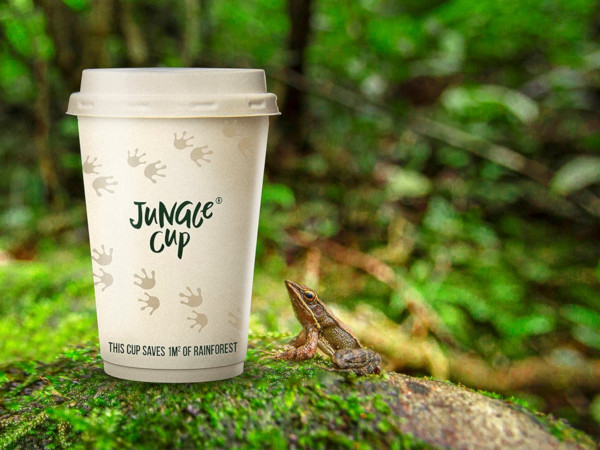BrandBase launches Jungle Cup; first plastic-free, home compostable disposable cup

Jungle Cup is the world’s first plastic-free disposable coffee cup that biodegrades in 12 weeks without industrial processing, introduced by BrandBase. They call it the Jungle Cup because for every cup sold, enough money is donated to an international conservation organization called Rainforest Trust to protect 1m2 of threatened rainforest.
Jungle Cup is a perfect solution for large and small companies around the world, that want to stop selling single-use coffee cups with plastic inner linings that are not biodegradable and nearly impossible to recycle.
16 billion coffee cups a year
Every year, an estimated 16 billion single-use paper coffee cups are used globally. All disposable cups currently on the market contain a thin plastic inner lining to prevent leaking. Because it is attached to paper, this plastic lining makes disposable cups extremely difficult to recycle.
The first plastic-free, home compostable cup
The Jungle Cup replaces the plastic inner lining with a patented water-based thin membrane material that is Flustix certified as plastic-free. It is also the only disposable cup in the world certified as OK compost HOME, meaning it is biodegradable in a natural setting, such as a home compost heap. The Jungle Cup helps combat the evils of ocean plastic.
The lids are made of an organic home compostable material called bagasse, which is a fibrous residue leftover after sugarcane or sorghum stalks are crushed to extract their juice.
12 weeks versus 1500 years
After use, people can simply dispose of the Jungle Cup in any compost bin and it starts to biodegrade in about 12 weeks. Bioplastic is believed to take approximately 1500 years to biodegrade. And the polyethene plastic liners of traditional disposable cups never disappears.
Compostable versus home compostable
While many varieties of single-use cups on the market today are certified as industrially compostable, they are only biodegradable in unnatural conditions, including constant and very high temperatures. In practice, very few disposable cups ever make it to industrial processing plants.
Functional, affordable and environmentally friendly
BrandBase took up the challenge to launch the development of an environmentally friendly alternative to disposable cups that works just as well as cups made with plastic. Paul Alberts, founder of BrandBase: “This challenge meant creating a disposable cup that can handle both hot and cold beverages, that you can print on, and that doesn’t cost much more to produce. And we have succeeded. Our cups are available for € 0.03 each.”
Saving jungles
For each Jungle Cup, the Rainforest Trust receives a percentage of the proceeds to fund the protection of the world’s rainforests. Paul Alberts: “To be precise, this amounts to 1m2 of rainforest being protected per cup sold. The task of protecting the rainforests and other threatened habitats is in the hands of the Rainforest Trust, an international organisation that does this work across the world. In the last few months of 2020 alone, our contributions have helped the Rainforest Trust save more than 3 million m2 of rainforest. Our aim for 2021 is more than 100 million m2. The biggest brands in the world really have no reason to continue using cups with plastic liners and lids.”
www.brand-base.com
www.junglecup.com
Have anything to add to this article? Like and follow us on Facebook and Twitter to ensure you don’t miss out on future updates from us.